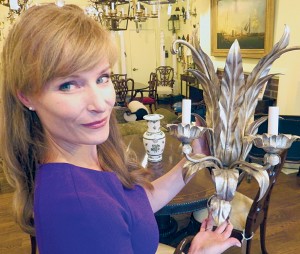What’s old is new at The Federalist
For the past 20 years ”” including the last five months under new owners ”” The Federalist in Greenwich has provided high-end reproduction furniture and lighting fixtures to a well-heeled clientele coast to coast.
In particular, the store notably is classing up the Sun Belt; The Federalist”™s largest client bases are in Florida, Texas and California.
In a world where craftsmanship is said to be on the decline, the three-room store, occupying 4,000 square feet of an appropriately Federalist-style building at 95 E. Putnam Ave., furthers the careers of polishers, carpenters and carvers in the U.S. ”” Massachusetts is a production hotbed ”” and light makers in Florence, Italy, where the store gets its chandeliers and wall sconces.
Light fixtures account for about 40 percent of the store”™s business.

- Jennifer Charlebois Martin, CEO and co-owner, The Federalist, with a hand-rubbed lighting fixture in the Greenwich store.
On a recent rainy afternoon, co-owner and CEO Jennifer Charlebois Martin said, “It really comes down to quality. We”™re not a lighting and furniture store. Our products are all handmade and all custom. For us, the product and its quality are so important.”
Pointing to a glass-and-metal lighting fixture, Jennifer”™s husband and fellow co-owner Christopher Martin said, “Some of these finishes cannot be reproduced in a factory. The pieces are authentic, not something you would find in a showroom. It”™s all about the fit and finish; where you don”™t notice the welds and where the heavy pieces may actually be hollow tubing that, because of its finish, looks heavy. The bar for our suppliers is high.”
Local suppliers enter the equation for alterations of existing pieces, he said.
The Martins live a mile from the store. Christopher Martin, an accountant and lawyer by training and profession, is principal of Stamford-based law firm Martin LLP. Jennifer Martin worked for 25 years in the financial industry.
The Federalist”™s third co-owner, David Santora, was not present the day the Martins spoke. Santora and Christopher Martin are responsible for the store”™s one-, five- and 10-year plans and for marketing initiatives. The store”™s sales manager is Russell Raiteri.
The Federalist was founded by John Ehrlich, who sold in May.
“You might think these pieces are only for an 18th-century home, but we”™ve discovered there is an eclectic appreciation of them,” Jennifer Martin said. “A lot of designers will mix modern and mid-19th century. We hear from designers and architects about the appeal of furnishings from different periods.”
Raiteri, a New York City transplant, cited “authenticity” as key. Indeed, the pie-crust tables appear to be waiting for James Madison himself ”” one of the authors of the original Federalist Papers. In another space ”” there are three distinct rooms inside the ground-floor front door ”” a small forest of bed headboards and footboards possess the simplicity and heft of the American forest primeval.
That they are modern defines “counterintuitive.”
Both Jennifer and Christopher said The Federalist is about buying a story: a sideboard bonded with dowels or a copper-gone-green light fixture or even an 18th-century-style oil painting. A client who owns a Dallas penthouse recently bought seven lighting fixtures that, unlighted, blazed with metallic colors.
“Do you see the red highlights?” Jennifer asked, pointing to a detail. The light had been hand rubbed 22 times.
If there is a commonality to The Federalist”™s pieces, they all look loved for a long time in homes without messy children. It”™s a bit of a fib, but the quality easily overcomes the calendar. It might sound appealing to sleep in a creeky Federalist-period bed, but it”™s likely more comfortable to sleep on a sturdy reproduction.
Those who have made the Federalist”™s stories their own are legion and nationwide. Federalist pieces are in the White House, which is built in the neoclassical Federalist style, and Augusta National Golf Club. Locally, the Greenwich Country Club bought the store”™s furniture and light fixtures. In New York City, the InterContinental New York Barclay on 48th Street and its parent InterContinental Hotels Group, PLC are clients.
The buying usually begins with a visit to the website ”” thefederalistonline.com ”” followed by a phone call that explores options.
“Generally, clients buy via brand and reputation,” Jennifer Martin said. “They buy sight unseen ”” no touch and no feel. But they know that nothing walks out unless it is personally inspected.”
Raiteri ticked off common characteristics of the shopping experience that include discussion of details like finish and size.
“The website is a way to be introduced to a piece, see it and call for more information,” he said. That”™s how we build relationships.”
Christopher Martin called the website “the entrée” that leads to the call.
Raiteri said, “The ”˜wow factor”™ is the product integrity and the authenticity of the product and the brand. Craftsmanship ”” the lost art, the timeless tradition ”” was relevant in its day. And it still has its mark everywhere you look today. The craftsmen who supply our products are not so much about money. A lot of their pieces rise to the level of artwork. This really differentiates The Federalist from another store that tries to reproduce a Federalist item.”
Although pieces arrive constantly, Jennifer Martin said each package is like a holiday gift, exciting to unwrap.
“I am in awe of what this individual has done,” she said.
Nicholas Pennella, a sales associate, oversees shipping, which, with a smile, The Federalist calls “fulfillment services.”
“Shipping is one of the most important aspects of the business,” Jennifer Martin said. “Clients want it in the best condition possible.” Craters are hired for big chandeliers.
“All their products are outstanding,” said customer Kathleen Montgomery of The Plains, Virginia, who has bought indoor and outdoor lighting fixtures at The Federalist and who shopped there the day the Martins and Raiteri spoke. “They have no competition.”